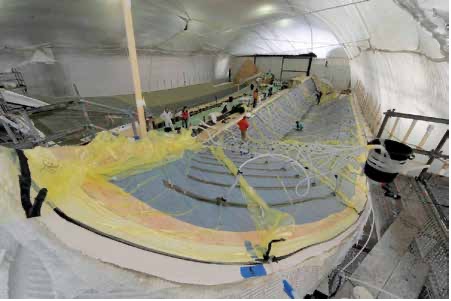News
Closed Mold Processes Significantly Reduce Emissions Impact

The proliferation of the use of closed mold processes in composites manufacturing is contributing to the longstanding efforts to reduce the environmental impact of manufacturing emissions. One of closed molding’s greatest benefits is that it offers substantial emissions reductions. Fabricators in the Aerospace, Marine, and Wind Energy markets are leading the effort in the adoption of closed mold processing for its environmental benefits, and so many more.
Improving worker comfort and safety
The emissions generated in composites manufacturing processes, as with many industries, are regulated by state, federal, and international regulatory agencies. Volatile organic compounds (VOCs), and more specifically hazardous air pollutants (HAPs), can have harmful effects when exposed. The health and safety of manufacturing workers are one of the most significant reasons to transition from open mold to closed mold processing.
Efforts to reduce emissions in composites manufacturing
The composites manufacturing industry has explored many strategies to help reduce and neutralize emissions, from formulators developing commercial lines of low-v styrene and styrene-free resins targeted toward marine and bathroom/spa markets to thermal oxidation processes that destroy carbon fiber emissions.
Closed mold processes like the Vacuum Infusion Process present an opportunity to drastically reduced styrene emissions as compared to wet lay-up vacuum bagging and open-molding processing. Vacuum Infusion reduces waste and emissions and leads to a cleaner, healthier working environment.
In addition to closed mold being a cleaner process that virtually reduces emissions to zero, the processes of Light Resin Transfer Molding (Light RTM), Vacuum Infusion, and Reusable Bag Molding offer many advantages over open molding, such as:
- Fewer consumables needed for manufacturing
- Lower material and disposables costs in Light RTM and Reusable Bag Molding
- More consistent, repeatable process
- Reduced cycle times
- Higher productivity
- Lower labor costs
As part of the Closed Mold Alliance, Composites One helps composites manufacturers across industry verticals to transition from open to closed molding. Customers can access all the products needed for Light RTM and Reusable Bag Molding, as well as Aerovac process materials for Vacuum Infusion. Customers will also benefit from the expertise and technical support needed to transition to these environmentally friendly processes.
Learn more about the benefits of closed molding.

